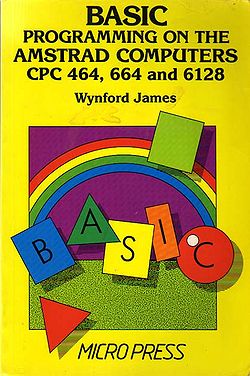Difference between revisions of "BASIC Programming on the Amstrad computers"
(→Contents) |
|||
| Line 44: | Line 44: | ||
[[BASIC Programming on the Amstrad computers - Index|Index]] | [[BASIC Programming on the Amstrad computers - Index|Index]] | ||
| + | |||
| + | == Review == | ||
| + | |||
| + | ''BASIC PROGRAMMING ON THE AMSTRAD COMPUTERS 464, 664 and 6128'' | ||
| + | |||
| + | The CPC 6128 and 664 incorporates the CPC 464 with Amstrad‘s disk drive in one unit. This book, as the title suggests, covers BASIC programming on all three machines. lt takes the reader from the very beginning covering the first principles of BASIC programming. The last few chapters cover topics of more specialised interest such as the use of sound and how to create the files and read data from them. Each chapter conta ins example programs and exercises. | ||
| + | |||
| + | ''The Author'' | ||
| + | |||
| + | Wynford James writes educational material (including soft ware) for a major microcomputer company. Prior to that he was a technical author for ICL. He has also taught mathematics and was actively involved in the development of computer studies throughout his school. | ||
| + | |||
[[Category:Books]] | [[Category:Books]] | ||
Revision as of 09:33, 11 July 2008
Information
| Title: | Basic Programming on the Amstrad Computers CPC 464, 664 and 6128 |
| Authors: | Wynford James |
| Publiser: | Micro Press |
| Year: | 1985 |
| Pages: | 229 |
| ISBN: | 0-7447-0036-1 |
Contents
2. Programming
4. Loops
6. Strings
10. Sound and Music
11. Files
Review
BASIC PROGRAMMING ON THE AMSTRAD COMPUTERS 464, 664 and 6128
The CPC 6128 and 664 incorporates the CPC 464 with Amstrad‘s disk drive in one unit. This book, as the title suggests, covers BASIC programming on all three machines. lt takes the reader from the very beginning covering the first principles of BASIC programming. The last few chapters cover topics of more specialised interest such as the use of sound and how to create the files and read data from them. Each chapter conta ins example programs and exercises.
The Author
Wynford James writes educational material (including soft ware) for a major microcomputer company. Prior to that he was a technical author for ICL. He has also taught mathematics and was actively involved in the development of computer studies throughout his school.
